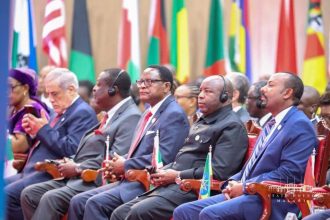Malawi kwacha gains excite Goodall Gondwe

Malawi’s Finance, Economic Planning and Development Minister Goodall Gondwe has told Nation Online that he is delighted with the current appreciation of the kwacha against other major international currencies, especially the US dollar.
“I did say that in two weeks time, we are going to have a stabilised exchange rate and [everyone] was thinking that I must have been dreaming.
“In fact, within one week, stabilisation took place. I am happy that the free depreciation that we were experiencing at that time was halted and so, I am happy indeed,” said Gondwe in an exclusive interview.
A sharp fall in the value of the kwacha in September last year, was one major economic highlight of the local currency as it sent shivers to local importers and manufacturers who were left with no choice, but to raise more to finance their import demands.
The currency traded as high as K520 in some authorised dealer banks (ADBs), a 33 percent sharp fall from a rate of K390 in August last year.
Quizzed on an equilibrium price of exchange rate he thinks will put him at comfort, Gondwe said: “If it goes to as low as K450 to a dollar, I think that will certainly be a good rate and even lower than that. That will be the normality of the economy.”
Some economists have linked the ongoing appreciation of the kwacha against US dollar to the falling crude oil price on the international market, prompting fuel importers to pay less in foreign currency to import oil and other energy commodities.
But Gondwe said the kwacha has appreciated against the dollar largely because of short-term external borrowing by Treasury.
“Look, borrowing for short term purposes has not started by us. In America, or where ever you go, you find that Americans themselves are borrowing heavily from the Chinese just to adjust their exchange rate. And the British are doing the same. It is also happening in a number of countries elsewhere,” he said.
He clarified that Treasury had to exchange a government debt for a private debt and such a private debt was in form of foreign exchange inflows “and it was in our favour as far as the exchange rate was concerned”.
While the minister further declined to shed more light on the transaction, he envisaged lowering average inflation rate to between 15 and 20 percent in 2015.
Currently, Malawi’s headline inflation rate is at 23.7 percent as of November, according to the National Statistical Office (NSO), but according to Gondwe, the rate is still too high.
Gondwe said bringing down inflation would also depend on the amount and pattern of rains as well as harvests during the year.
Gondwe said the volatility of the kwacha is not new since Malawi became independent in 1964.
“That’s why in some cases, a managed exchange rate is good because you can manage it in such a way that the rate responds to what your needs are,” said Gondwe.






Who really is correct here in their claim of why the kwacha
is appreciating; the economists who argue that it is low global oil prices that
is driving the kwacha appreciation or the Minister who argues that the kwacha
appreciation is as a result of the action taken by Treasury?
In order to answer this question, the answer lies in the
analysis of the Balance of Payment (BoP) accounts framework. The current
account balance (CAB) of goods and services, income and current transfers must
be financed by the Capital and Financial account (Direct foreign investment,
DFI, portfolio investments, other investments and Reserve assets (Gold, SDR and
foreign currency assets). The Malawi economy is unbalanced and is forever operating
with a negative CAB. Meaning the country has net deficit of exports less imports
of goods and services. Reduced oil prices mean that this CAB deficit is not as
big as it normally is. That action has the effect of improving the kwacha
exchange rate as the gap between exports and imports of goods and services is
narrowed. Therefore the claim that reduced oil prices has contributed to the
kwacha appreciation is correct.
On the other hand, the minister’s argument that Treasury has
taken action to borrow refers to the direct action the govt has taken to borrow
on the Capital and Financial account portfolio investments. Such external
borrowing has a positive effect on the kwacha appreciating. Therefore, it
correct that the treasury action has improved the kwacha exchange rate. For me
I see some positives in the action taken by Treasury. One, it is the right
thing to do so. Two Malawi is using the full list of tools and instruments
available to manage the currency exchange rate. Normally, I would condemn such
an action of external borrowing for consumption instead of investment. However,
in this case this action will enable the govt to meet its short term commitments
such as paying salaries for civil servants (teachers, police, pensioners etc).
Therefore it is justifiable.
BoP structure provide a range of tools and instruments
available to the govt to stabilise the exchange rate without resorting to using
official foreign reserves assets of the Capital and Financial account. Having
said that, our nation must really focus on improving its international competitiveness
to achieve a surplus CAB of goods and services. That is why I advocate
industrial revolution in Malawi to balance our public finances, to create
wealth, to create jobs, stabilise the kwacha with a surplus CAB, reduce
inflation, and to create exponential economic growth towards $200bn in GDP for
our people to enjoy prosperity.
In conclusion, both claims are correct. It is important to
reference the BoP structure when managing the currency exchange rate in a
managed rate regime. Malawi needs industrial revolution to really boost its
international competitiveness and its international investment position (IIP).
Industrial revolution Now!!!